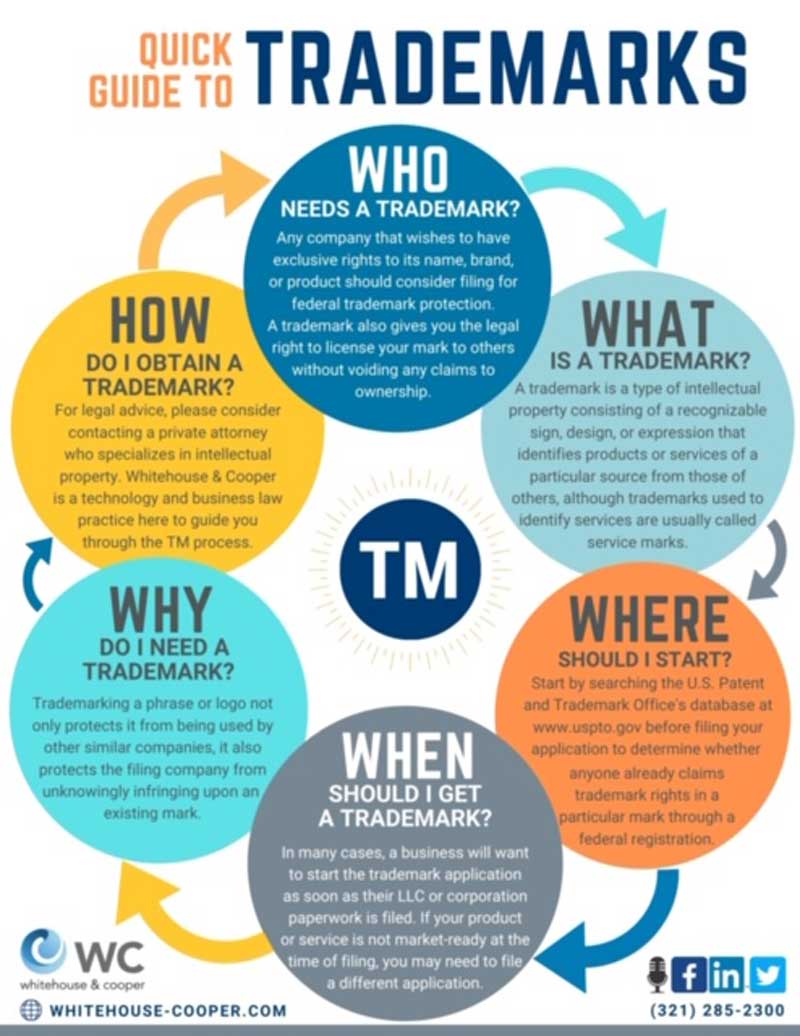Written by Daniel D. Whitehouse, Esq.
To a new or existing company, rebranding or launching a new brand is an exciting time. But you need to make sure your legal bases are covered. While most business owners tend to focus on the marketing aspects of branding, many neglect or are unaware of the legal aspects. This lack of attention or knowledge can negatively impact the value of your business and the products or services you offer, while opening the door for competitors and other opportunists to use and profit from your hard work.
Intellectual property results from original creative thought, such as trade secrets, copyright, and trademarks. Federal and state law provides the legal right to claim ownership of and protect your company’s intellectual property. Protecting intellectual property is important because it provides you the exclusive right to use the intellectual property and exclude others from doing so. Any company that wishes to have exclusive rights to its name, brand, or product should consider filing for federal trademark protection.
As follows are some basic legal issues you need to consider before you move forward with any branding initiative.
Trademarks – whether or not they are legally registered – are the core components of your brand. A trademark is a type of intellectual property consisting of a recognizable sign, design, or expression that identifies products or services of a particular source from those of others, although trademarks used to identify services are usually called service marks.
It may seem obvious, but it is important to choose the name of your business, product, or service carefully. You can start by searching the U.S. Patent and Trademark Office’s database at www.uspto.gov before filing your application to determine whether anyone already claims trademark rights in a particular mark through a federal registration. Before you get too attached to a name or invest time and money into it, also consider having an attorney conduct a preliminary clearance search. This will ensure that you do not infringe upon another company’s mark, which could result in a lawsuit or force you to go through a costly rebranding process.
You also need to make sure that the name you choose is entitled to trademark protection. For example, you cannot trademark a generic term such as “widget” or “software,” and unless you are famous you probably cannot trademark your name. Words, designs, slogans, symbols, logos, distinctive colors and shapes, or any combination of these can be trademarked. After you have determined your desired mark is not already trademarked and is entitled to trademark protection, you can file a trademark application.
Although you do not have to use a trademark before filing for an application, you do have demonstrate “use in commerce” to the trademark office. That means you are using the mark for business purposes in a way that can be regulated, not just to reserve or claim rights on the mark. Use of the mark on packaging or in marketing, offline or online, for the purpose of making a sale qualifies as “use in commerce.” A trademark also gives you the legal right to license your mark to others without voiding any claims to ownership.
Keep in mind that rights to a trademark are acquired through use of the trademark, not just by registration of the trademark. For example, if you plan to spend months or even years developing a strategic plan before you actually use your mark, you can submit an Intent-to-Use Trademark application, which reserves the mark from the filing date. Although neither federal nor state registration are required, there are benefits to both.
Download and print Whitehouse & Cooper’s Quick Guide to Trademarks. For legal advice on the trademark process, please consider contacting a private attorney who specializes in intellectual property.
ABOUT DANIEL D. WHITEHOUSE, ESQ.
WHITEHOUSE & COOPER, PLLC
 Daniel D. Whitehouse entered the legal profession with more than a decade of experience in the information technology (IT) industry and managed the IT infrastructures of some of the world’s largest companies. Mr. Whitehouse brings his unique blend of technology, law, and business experience to his clients of his firm, Whitehouse & Cooper. He is a member of The Florida Bar, the Orange County Bar Association, and the Lake County Bar Association. He participates in numerous sections and committees within these associations and serves on the OCBA Technology Committee and is past chair. He is admitted to practice in all Florida state courts and the Middle District of Florida. He is available for speaking presentations adaptable to seminars, virtual seminars, college classes, webinars, panel discussions or podcasts. Visit his website for more information at https://www.whitehouse-cooper.com/.
Daniel D. Whitehouse entered the legal profession with more than a decade of experience in the information technology (IT) industry and managed the IT infrastructures of some of the world’s largest companies. Mr. Whitehouse brings his unique blend of technology, law, and business experience to his clients of his firm, Whitehouse & Cooper. He is a member of The Florida Bar, the Orange County Bar Association, and the Lake County Bar Association. He participates in numerous sections and committees within these associations and serves on the OCBA Technology Committee and is past chair. He is admitted to practice in all Florida state courts and the Middle District of Florida. He is available for speaking presentations adaptable to seminars, virtual seminars, college classes, webinars, panel discussions or podcasts. Visit his website for more information at https://www.whitehouse-cooper.com/.











